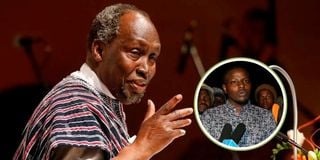
Renowned Kenyan novelist Ngũgĩ wa Thiong’o. Inset: Cartoonist Gideon Kibet alias Kibet Bull.
On January 12, 1978, missing novelist Ngũgĩ wa Thiong’o was finally traced to Kamiti Maximum Prison, where he had been detained without trial over his controversial Kikuyu play Ngaahika Ndeenda (I Will Marry When I Want).
At 39, Ngũgĩ, then the head of the Department of Literature at the University of Nairobi, had been picked up — read abducted — by authorities on the night of December 31. His crime? Daring to criticise the ruling establishment through art.
Forty-six years later, and on the anniversary of Ngũgĩ’s detention, history echoes eerily now under the 2010 Constitution. Gideon Kibet alias Kibet Bull, a young satirist whose caricatures of President William Ruto went viral, has disappeared.
His abduction and that of other young people who have disappeared in recent weeks represents a modern incarnation of detention without trial, targeting those who dare to exercise their freedom of expression — an idea seemingly incomprehensible to the current regime. His whereabouts, and that of other youth, is unknown.
Should art be criminalised? Or rather, can any form of artistic expression be criminalised?
The Universal Declaration of Human Rights reminds in Article 18 that “Everyone has the right to freedom of opinion and expression [and that] this right includes freedom to hold opinions without interference, to seek, receive and impart information and ideas through any media and regardless of frontiers”.
This is reflected in our Constitution, which the President swore [with a Bible] to defend. The only limitations are when such expression is used as propaganda for war; incitement to violence; hate speech; or advocacy of hatred. There are laws that govern that—and no country leaves that role to abductors and kidnappers to act as judges.
During General Augusto Pinochet’s rule in Chile, the abducting squad used to throw victims into the sea from a helicopter off the coast of Valparaiso, and most were never seen. In our neighbouring Uganda, Idi Amin’s State Research Bureau used to feed Nile crocodiles with human bodies.
We seem to be retrogressing fast. In Ngũgĩ’s era, Kenyan law allowed police and politicians to detain government critics indefinitely, often for “offending” the ruling class. While times have ostensibly changed, the tactics remain the same.
Today, tens of youthful government critics and dissenters have vanished without a trace. The authorities, as always, feign ignorance, claiming no involvement. It is more shocking that the Inspector-General of Police, Douglas Kanja, claims to be in the dark — which only means that there is a kidnapping gang that has outwitted the police. That is a much bigger story.
Back then, in the Jomo Kenyatta and Daniel arap Moi years, a writ of habeas corpus could compel the State to either release an abducted critic or gazette their detention and justify it in court. Now, not even court summons seem to move the powers that be.
The sight of Billy Mwangi’s father weeping openly in court — pleading for his abducted son — failed to stir the conscience of a government that thrives on silencing its critics.
Since December 2024, we have seen the disappearance of Steve Mbisi from Machakos, Billy Mwangi (Embu), Peter Muteti (Nairobi), Bernard Kavuli, Kibet Bull, and his brother Ronny Kiplagat. Yet, the best we have heard from National Assembly Majority Leader Kimani Ichung’wah is that those behind the abductions are opponents out to soil the government’s image. In Sophocle’s play Antigone, evil appears as good in the minds of those whom God leads to destruction. I will leave it at that!
Let us turn to the Judiciary. In the Moi years, the Judiciary forced police to dig up several graves in the endless search for the missing Stephen Mbaraka Karanja—a government critic. Karanja was never found and the best the police did was to admit that they killed him during interrogation.
The Judiciary was used as the clearing house for the tortured and those who survived the Nyayo House 25th floor and basement terror led by James Opiyo of Ranen, near Rongo in Migori County, and those trained by Romanian dictator Nicolae Ceausescu before he was deposed and killed in 1989.
Despite President Ruto’s assurances to end the wave of abductions, the missing critics remain unaccounted for. Instead of addressing their plight, Ruto has shifted the narrative, asserting that freedom of expression must have boundaries. He warns against the “misuse” of social media, suggesting it could undermine societal values. Yet, by targeting dissenting voices, his administration risks fostering a suffocating culture of silence.
Freedom of expression
As J.S. Mill eloquently argues in his seminal work, On Liberty, censorship robs society of its most vital asset: the truth. Mill argues that when opinions are suppressed, even those grounded in falsehood, society is denied the opportunity to weigh them against the truth. This comparative process, Mill contends, is essential — not only for appreciating the truth, but also for strengthening our collective ability to navigate the uncertainties of the future.
In the famous Handyside case, in which Richard Handyside sought to be allowed to distribute obscene material, the European Court of Human Rights, while appreciating that freedom of expression had limitations, argued that the State could only limit it only if it was “necessary in a democratic society.”
This case was important in that the Court defined freedom of expression as one of the essential foundations of a democratic society.
“It is applicable not only to ‘information’ or ‘ideas’ that are favourably received or regarded as inoffensive, but also to those that offend, shock, or disturb the State or any sector of the population.” And that should be understood by the abducting squad.
The detention of Ngũgĩ, the deportation of pioneering cartoonist Terry Hirst under Moi’s administration, and a litany of similar incidents serve as stark testaments to the perils faced by creative dissenters. During the fervent push for multi-party democracy, numerous musicians had their works banned, some merely for extolling opposition leaders or daring to satirise the ruling party, Kanu.
Across Africa, the story is all too familiar: artists silenced, imprisoned, or exiled for wielding their craft as a mirror to society. From the haunting melodies of South Africa’s Miriam Makeba to the defiant rhythms of Nigeria’s Fela Kuti, the continent’s creative vanguard has long endured the wrath of regimes intolerant of dissent.
Here’s a question: What does a nation lose when it chooses to stifle its artists and thinkers? Ngũgĩ’s words and Kibet Bull’s caricatures are not just acts of defiance; they are mirrors reflecting the society we have become. And yet, the government’s intolerance threatens to shatter those mirrors, leaving us blind to our own image.
In the age of social media, it is hard to crack down on creatives. It is the little price we have to pay for the liberties that we enjoy. In 2010, we all recall how Zimbabwe’s Owen Maseko was arrested over 12 paintings featuring violent recollections of the murder of up to 20,000 Ndebele people in the south of the country in the 1980s. He was charged with undermining then President Robert Mugabe’s authority, under the Public Order and Security Act. In 1991, Moi also banned the production of George Orwell’s play, Animal Farm.
Freedom of expression is not a gift to be bestowed or withheld at whim—it is a right. Kibet Bull’s disappearance is not just his tragedy; it is a dark stain on the conscience of a nation that once fought for its liberation. The road from Ngũgĩ to Kibet Bull is paved with the same repression, only now the tactics are more insidious, and the silence more deafening.
Let us not forget: Paul Goebbels, the master propagandist of the Nazi regime, championed freedom of speech — so long as it served his agenda. Similarly, Joseph Stalin wielded the rhetoric of liberty while silencing dissent with an iron fist in the Soviet Union. Thus, we must discern the critical difference between hate speech and the more insidious notion of “speech I hate”. In this lies the true test of our commitment to the principles of free expression.
On the anniversary of Ngũgĩ’s detention, we have to look back and ask: Have we made any progress?
[email protected]; On X: @johnkamau1










